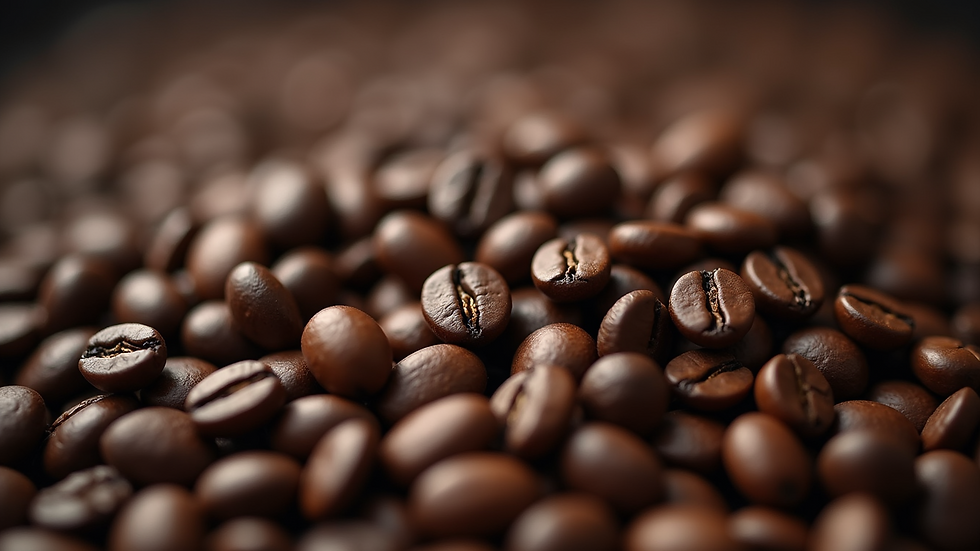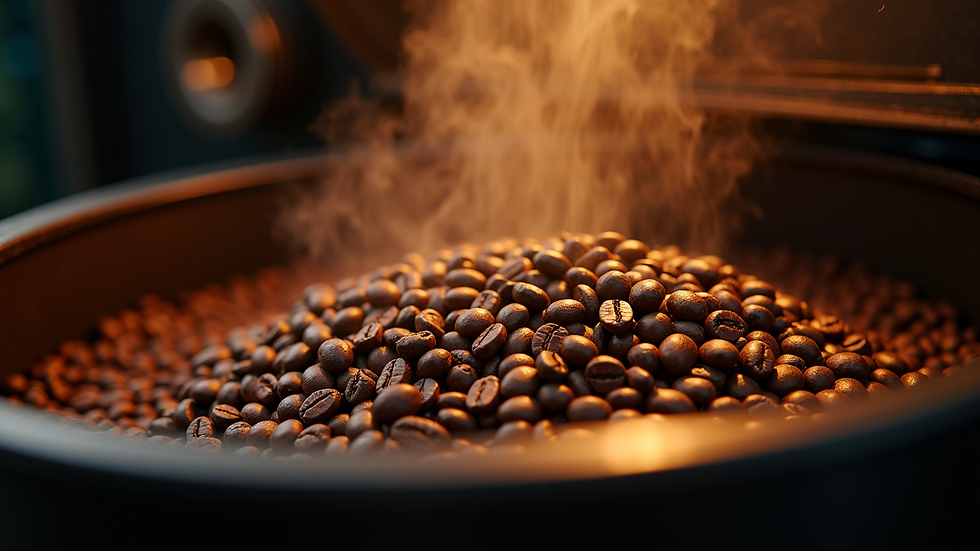Discovering the Unique Joys of Specialty Coffee
- Jonathan Lambert

- May 29, 2025
- 5 min read
Coffee lovers around the world have long celebrated the rich and diverse flavors that this beloved beverage offers. However, in recent years, a particular trend has emerged that takes coffee appreciation to a whole new level: specialty coffee. This is not just any regular cup of joe; it encompasses a range of unique flavors, exceptional quality, and an entire culture dedicated to the art of coffee-making. In this blog post, we will explore the unique joys of specialty coffee, from its origins to brewing techniques and tasting experiences, and help you uncover a whole new world of coffee enjoyment.
What Is Specialty Coffee?
Specialty coffee is defined as coffee that has been evaluated and graded by a certified cupper, scoring 80 points or above on a scale of 100. This grading process considers factors such as flavor, aroma, acidity, and body. The term also refers to coffee produced under specific conditions, ensuring the highest quality from farm to cup. Specialty coffee beans are typically grown in ideal climates, harvested by hand, and processed with care to retain their unique flavor profiles.
By focusing on single-origin beans, specialty coffee enables consumers to explore the distinct tastes that different regions offer. For example, Ethiopian coffees often have floral and fruity notes, while Colombian beans may provide a smooth and nutty flavor. Each cup tells a story of its origin, taste, and the people behind the coffee-making process.

The Specialty Coffee Experience
To truly appreciate specialty coffee, one must dive deeply into the entire specialty coffee experience. This encompasses understanding the various brewing methods, learning how to identify tasting notes, and exploring the different ways coffee can be enjoyed.
Brewing methods play a significant role in how a coffee's flavor profile is expressed. Popular methods include pour-over, French press, Aeropress, and espresso machines, each producing distinct flavors. For instance, pour-over brewing extracts clarity in flavors, while French press offers a fuller body and robust taste. Experimenting with different techniques can enhance your coffee journey and ultimately lead to a better appreciation of specialty coffee.
Exploring Different Brewing Methods
When it comes to brewing specialty coffee, you have a wealth of options to choose from. Here are some popular methods you can try at home:
Pour-Over: This method allows for control over your brewing time and water temperature. With a cone-shaped dripper and a paper filter, you can brew a clean and complex cup of coffee. Experiment with different grind sizes and water temperatures to discover the flavor profile you prefer.
French Press: This method gives you a bold and robust brew. Coarsely ground coffee beans are steeped in hot water for a few minutes before being pressed down, resulting in a rich and full-bodied cup.
Aeropress: Known for its versatility, the Aeropress has gained popularity for its ability to make espresso-style coffee quickly. Adjusting brew time and pressure allows you to customize the strength and flavor of your cup.
Espresso: Perfect for those who enjoy concentrated coffee, espresso brewing involves forcing hot water through finely ground coffee. This method produces a rich, thick creama, making it an excellent base for various coffee drinks.
Each brewing method offers opportunities to explore nuances in flavor, aroma, and body. Investing time in learning about these techniques can deepen your understanding and appreciation of specialty coffee.

Tasting Specialty Coffee
Tasting specialty coffee is where it all comes together. When you have the right beans and perfect brewing method, understanding how to taste and evaluate coffee is crucial. Here are some tips to enhance your tasting experience:
Aroma
The first step in tasting coffee is to evaluate its aroma. Swirl the cup gently and sniff deeply. Take note of what scents you can identify. You might detect floral, fruity, nutty, or chocolatey notes. Aroma sets the stage for the flavors you will experience.
Flavor
Take a sip of your coffee and let it wash over your palate. Pay attention to the different taste sensations you encounter. Is it sweet, acidic, or bitter? Specialty coffees are often complex, featuring multiple flavors that interact with one another. Try to identify specific tasting notes that resonate with you.
Body
The body of the coffee refers to its weight and texture on your palate. A coffee with a light body feels clean and crisp, while a full-bodied coffee feels creamier and heavier. Analyzing the body of your coffee adds another layer of appreciation to your tasting journey.
Aftertaste
Finally, consider the aftertaste (also known as the finish) of the coffee. This is what you taste after swallowing. Some coffees have a lingering sweetness, while others may leave a dry sensation. Identifying aftertaste can reveal much about the coffee's quality and craftsmanship.

The Community Around Specialty Coffee
One of the most rewarding aspects of specialty coffee is the sense of community it fosters. Whether you explore local coffee shops or join online forums, connecting with fellow coffee enthusiasts can enhance your experience tremendously.
Many specialty coffee shops take pride in their sourcing practices and often showcase the farmers and communities behind their beans. Visiting such shops allows you to learn more about the beans you're drinking while supporting ethical practices. You may even attend tasting events, coffee classes, or workshops to elevate your knowledge and skills further.
Additionally, numerous online platforms and communities provide resources and information on brewing, tasting, and quality evaluation. Engaging with these communities can lead to exciting discoveries, helping you broaden your palate and deepen your coffee appreciation.
Creating Your Own Specialty Coffee Experience at Home
You don’t need to be a barista to enjoy specialty coffee at home. Here are some practical tips for crafting your own specialty coffee experience:
Invest in Quality Equipment: Start with a good coffee grinder, scale, and brewing equipment. Freshly ground beans yield the best flavor, so investing in a burr grinder is worthwhile.
Choose the Right Beans: Opt for high-quality specialty coffee beans from reputable sources. Explore different regions and flavor profiles to find your favorites.
Experiment with Parameters: Adjust your brew time, water temperature, and coffee-to-water ratio during your brewing process. These factors can significantly affect the final taste.
Join a Coffee Club: Subscription services allow you to explore different beans regularly. This makes it easy to discover new offerings and keeps your coffee experience fresh.
Stay Curious: Never stop learning about coffee! Read books, follow coffee influencers on social media, or join tasting groups. The more you discover, the more you'll appreciate the journey.
By creating a dedicated space for your coffee practice and remaining open to new experiences, you can transform your daily coffee routine into a specialty coffee experience that excites and inspires.
Explore Further
From understanding the origins of coffee to experimenting with different brewing methods, the journey into specialty coffee can be an exciting adventure. As you explore different flavors and brewing techniques, take a moment to appreciate the passion and artistry involved in creating each cup.
If you haven’t yet experienced the delightful world of specialty coffee, now is the time to start your journey. Consider diving deeper into the specialty coffee community, explore quality beans, and embark on your own unique tasting adventures. With each sip, you'll join a growing family of coffee enthusiasts, all celebrating the rich experiences that specialty coffee brings.
So go ahead, brew your next cup, and relish in the unique joys that await you in every drop!





Comments